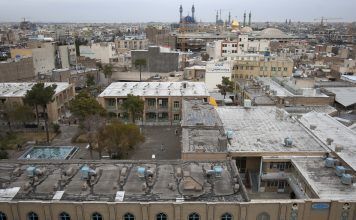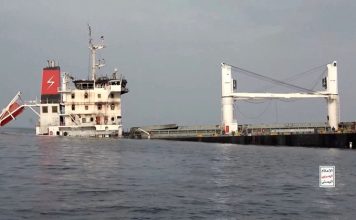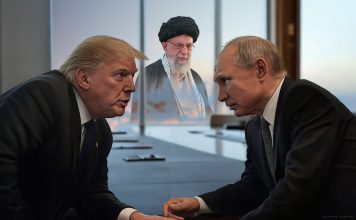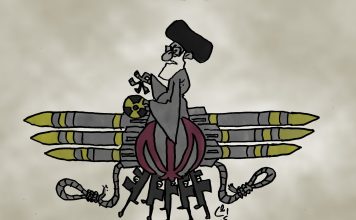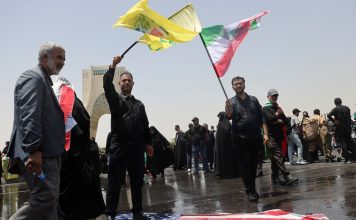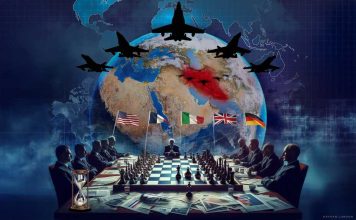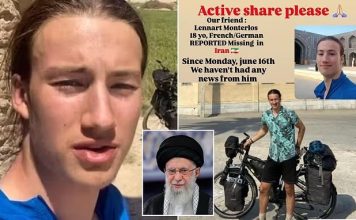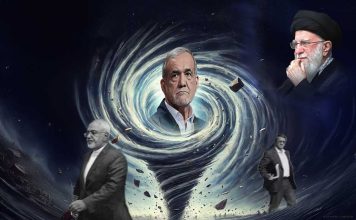
By Ahmad Rafat
The war in Gaza will end, eventually. While Israel will undoubtedly win the military battle, it is unclear what fate awaits Gaza once the conflict has ended. What is certain is that Hamas will lose its control over Gaza, and while this will not eliminate the Islamic Republic’s influence in the Palestinian territories, it will diminish it significantly.
Political and military leaders of the Islamic Republic and their regional proxies, including Lebanese Hezbollah leader Hassan Nasrallah, have unequivocally denied any involvement in the Oct. 7 terrorist attack by Hamas against Israeli civilians, which left 1,400 dead and led to the taking of more than 200 hostages.
Western governments, especially the U.S., have said that they had no intelligence or evidence proving Tehran’s direct involvement in the attack. However, it is inconceivable that Iran should have played no role at all in a terrorist operation that sparked the ongoing war and which so far has claimed the lives of 10,000 Gaza residents, nearly 4,000 of them children.
Israeli, European, and possibly U.S. intelligence agencies have information on Iran providing extensive financial support and military hardware to the Gaza Strip. The Islamic Republic increased that aid after a visit to Tehran by Hamas’s political leader, Ismail Haniyeh, and the leader of the Islamic Jihad Movement, Ziyad al-Nakhalah, in June, and their meetings with senior Iranian officials, including Supreme Leader Ali Khamenei.
US Special Envoy Warns Khamenei, Hezbollah Not to Spread Conflict in Middle East
The aim of the attack and Iran’s strategy were not to defeat the Israeli military, because that would have been utterly impossible. So what was the reason for the attack, and if it had no military objectives, what did it hope to achieve politically?
Hamas and the Islamic Republic’s first result with the Oct. 7 attack was a massive blow to the Israeli intelligence, military, and security apparatus. Israeli officials have admitted as much, prompting the Israeli public to seek answers from their government.
The Hamas attack dented the armor of invincibility of Israeli intelligence. Israeli intelligence has always boasted of their ability to monitor every move by Hamas and other armed Palestinian groups in the Gaza Strip and the West Bank. But they were caught by surprise on Oct. 7.
The massive intelligence failure tarnished the reputation of the Israeli military and security apparatus inside Israel, as well as across the Middle East, the Arab world, and even the West.
One Israeli journalist summed up the Oct. 7 attack as “Islamic Republic 1, Israel 0” in what the journalist described as the first round of conflict between the two countries.
The second goal of the Islamic Republic and its regional proxies was to fuel a domestic political crisis in Israel.
Although widespread protests by ordinary Israelis against the right-wing and extremist coalition government of Prime Minister Benjamin Netanyahu ended immediately after the Hamas attack, and opposition political parties stopped criticizing the current government because of the extraordinary conditions which the country finds itself in, public discontent inside Israel is increasing daily.
The Hebrew-language Israeli daily, Maariv, recently published the results of an opinion poll, which showed that 80 percent of those surveyed held Netanyahu responsible for the failure to discover and foil the attack by Hamas. Another survey published on Nov. 7 — exactly a month after the attack — showed that the popularity of the current coalition government dropped to 18 percent.
The attack, therefore, did allow Iran to achieve its goal of intensifying the domestic political conflict in Israel and reducing the popularity of the coalition government among Israelis.
By fueling the ongoing war, Iran also hopes to heighten tensions between Israel and Arab countries. Following the signing of the Abraham Accords in September 2021, Israel established diplomatic ties with the United Arab Emirates (UAE) and Bahrain. Yet Israeli efforts to normalize relations with Saudi Arabia, which had gained momentum in recent months, are now at a standstill.
While some Arab countries like Jordan and Bahrain have recalled their ambassadors to Israel, others have suspended all talks with the Netanyahu government. While no Arab country besides Qatar has ties to Hamas nor supports this terrorist group, they have strongly condemned Israeli air and ground assaults on the Gaza Strip.
The presence of the Israeli military in Gaza and the deaths of an increasing number of civilians in Israeli bombings have seriously strained Israel’s relationships with Arab countries.
Mossad Statement on Iran Regime-Backed Hezbollah Bust Strains Brazil-Israel Ties
European governments and the U.S. advocate a ceasefire in Gaza and have once again proposed a “two-state solution.” Some European officials, such as Belgian Deputy Prime Minister Petra De Sutter, have even called for sanctioning Israel.
United Nations Secretary-General Antonio Gutierrez has accused Israel of violating international law, and called the bombing of Gaza “collective punishment of the Palestinian people,” which could be interpreted as a war crime, even though he did not level that accusation against Israel.
Creating a rift between Western governments and Israel because of the latter’s continued air and ground assault in Gaza is another of the Islamic Republic’s reasons for fueling the war. Widespread pro-Palestinian protests around the world and condemnation of the war in Gaza is another success for Tehran in its strategy.
Contrary to speculation that circulated in the first days of the war, the Islamic Republic had no intention of getting involved in the war either directly or through proxies such as Hezbollah. Tehran’s goal is to pressure Israel and the U.S. military without getting involved in the war directly.
These actions included targeting small Israeli towns by using the Houthis, a Yemeni rebel group, to fire missiles or deploy suicide drones, and by allowing Hezbollah to fire periodic rockets from southern Lebanon. Tehran’s proxies have conducted 40 attacks on U.S. military bases in Iraq and Syria so far, with no casualties reported – proof of the Islamic Republic’s indirect involvement in the war.
Tehran knows that an escalation in these attacks could be used as a justification to launch a military attack on Iran. However, Israel and the U.S. do not wish to open up a new front under the current conditions and will not react in a strong way to these provocations.
Meanwhile, Iran’s short-term strategic wins will soon lead to a number of serious failures. The war in Gaza will end in a few months, and the Middle East will then face two choices in the aftermath, both of which will isolate the current ruling regime in Iran. The Middle East will have to choose between radicalism, or the severing of ties with terrorists, militia, and extremist groups.
If the population of the Middle East were to be radicalized, Iran would enter into direct military conflict with the West and moderate regional powers. Such direct military confrontation could put an end to the Islamic Republic, at least in its current form.
On the other hand, the Islamic Republic, as the principal proponent of the “axis of resistance,” will be defeated if the Middle East rejects extremist ideology and violence altogether, and instead chooses moderate policies which promote peaceful coexistence with Israel.
If that happens, the regime in Iran will be unable to use its proxies to play a role in regional and international politics — and will find itself utterly and completely isolated.

